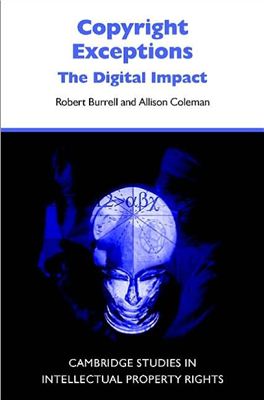Издательство Cambridge University Press, 2005, -458 pp.
The idea for this book arose out of conversations we had while we were both working at the University of Wales, Aberystwyth. At the time plans for a European Directive to deal with copyright in the ‘information society’ were at an early stage, but it was already apparent that copyright users were going to struggle to influence the legislative process. We were also conceed that plans for European harmonisation were premature, given that significant doubt remained (and still remains) about some of the directions in which technological developments were taking us. At the same time, however, we did not share the outright opposition expressed by some to any suggestion that copyright exceptions might be harmonised in Europe. In particular, it seemed to us that the United Kingdom’s permitted act regime was much too restrictive, and that European harmonisation might provide an opportunity to revisit the entire system of copyright exceptions to an extent that was unlikely to arise in the absence of European intervention in this area.
Copyright law seems to have lurched from one crisis to another over recent years. Debates have raged over how new types of subject matter can be accommodated within copyright law,2 whether the term of protection for copyright ought to be extended, how to respond to the unauthorised distribution of works over the Inteet and whether developing countries ought to be forced to adopt Weste copyright standards. More recently, controversy has also come to surround the copyright ‘exceptions’ or ‘defences’ or ‘permitted acts’ or ‘users’ rights’ that all mode copyright systems provide so as to privilege certain acts that would otherwise amount to an infringement of copyright. This controversy looks set to continue, with copyright exceptions receiving an unprecedented level of attention from officials, academics and legal practitioners.
Part I Where we are
Copyright and freedom of expression
Fair dealing for the purposes of criticism, review and news reporting and related exceptions
The public interest defence
Exceptions applying to education, research and private study
The library and archive provisions and related exceptions
Part II How we got here
Markets and metaphors
Copyright in supranational fora
Copyright in the domestic arena
Part III Where we go from here
The fair use panacea
A model for reform
The idea for this book arose out of conversations we had while we were both working at the University of Wales, Aberystwyth. At the time plans for a European Directive to deal with copyright in the ‘information society’ were at an early stage, but it was already apparent that copyright users were going to struggle to influence the legislative process. We were also conceed that plans for European harmonisation were premature, given that significant doubt remained (and still remains) about some of the directions in which technological developments were taking us. At the same time, however, we did not share the outright opposition expressed by some to any suggestion that copyright exceptions might be harmonised in Europe. In particular, it seemed to us that the United Kingdom’s permitted act regime was much too restrictive, and that European harmonisation might provide an opportunity to revisit the entire system of copyright exceptions to an extent that was unlikely to arise in the absence of European intervention in this area.
Copyright law seems to have lurched from one crisis to another over recent years. Debates have raged over how new types of subject matter can be accommodated within copyright law,2 whether the term of protection for copyright ought to be extended, how to respond to the unauthorised distribution of works over the Inteet and whether developing countries ought to be forced to adopt Weste copyright standards. More recently, controversy has also come to surround the copyright ‘exceptions’ or ‘defences’ or ‘permitted acts’ or ‘users’ rights’ that all mode copyright systems provide so as to privilege certain acts that would otherwise amount to an infringement of copyright. This controversy looks set to continue, with copyright exceptions receiving an unprecedented level of attention from officials, academics and legal practitioners.
Part I Where we are
Copyright and freedom of expression
Fair dealing for the purposes of criticism, review and news reporting and related exceptions
The public interest defence
Exceptions applying to education, research and private study
The library and archive provisions and related exceptions
Part II How we got here
Markets and metaphors
Copyright in supranational fora
Copyright in the domestic arena
Part III Where we go from here
The fair use panacea
A model for reform

